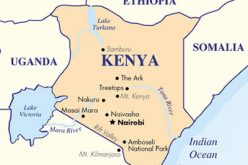 By Lawi Joel (TANZANIA DAILY NEWS) THE ghost of bloodbath on account of religious disharmony is rocking the country’s very foundation of peace and pushing the nation to the brink of abyss.
By Lawi Joel (TANZANIA DAILY NEWS) THE ghost of bloodbath on account of religious disharmony is rocking the country’s very foundation of peace and pushing the nation to the brink of abyss.
The conflict, the reason for which is still mysterious, is between the two major faiths of Christianity and Islam. The clerics of the two religions deny there is a quarrel between them, because they have always lived together in peace; but there is conflict indeed.
Christians and Muslims would have won more hearts and proved their piety of it if they practically demonstrated love with deeds and protecting life instead of destroying it or making it miserable.
An act of love begins with tolerance of the other faiths. An Asian guru Sri Sathya Sai Baba teaches that stability of the world with various faiths can best be achieved if the faithful truly serve the Almighty and there is no better way to do that by serving mankind.
“Doing good to mankind is service to God,” says the Indian religious teacher born in 1926 and who passed away in 2012. The oriental religious teacher says pointedly that a good religion is one that serves mankind, since by doing so it serves God. Christian and Muslims as Tanzania’s most prominent religions have not quite convinced the rest of the nation that they are a community of love, hence haven’t consolidated the country’s tranquility.
Yet it would not be quite right that the two religions are devoid of love in their sermon. Members of these two religions may have not fought a pitched war, but verbal attacks in the form of ridicules, are rampant and common. Clerics of the two faiths publicly disown the offensive preachers, purporting that what the outrageous sermons by some of their members are acting on their own without a directive of the leaders of the respective religion. Puzzling still is why the government has lost tooth to bite these peace-breakers.
Observers say it is because of the prevailing impunity that religious confrontations and bickering are going on. Complaining after an attack on her church in Tanga recently, a believer, one Elizabeth Haule asked: “Why is it only churches that are destroyed?” Obviously Ms Haule implies that since mosques are not attacked, Muslims must be responsible for the hell Christians are suffering.
However, other attacks against Christians exonerate Muslims from such atrocities on Christians. On May 5 this year Saint Joseph’s Roman Catholic Church in Arusha was attacked by a bomb that killed three and injured many people. Six people four of whom were Saudis and two Tanzanians were held in connection with the incident. Many members of the Christian community pointed an accusing finger to the four Saudis, who being Muslims, they used as proof that Muslims attacked churches in the country.
But a couple of days later investigation by police, the Immigration office, proved that the Saudis were tourists who had previously entered the country as visitors and accidentally happened to be in the town for tourist purpose. Shocked and saddened by the horror that had befallen the church, Muslim clerics, in a show of solidarity and brotherliness, paid a condolence visit to the church and expressed their sadness and sympathy for the attack.
So far the person accused to have hauled the bomb is one Victor Kalist Ambrose, Minister for Home Affairs Dr Emmanuel Nchimbi told the National Assembly. Victor Ambrose is a Christian and his attack upon his fellow faithful can only be pointing to the fact that his collaborators in the evil act come from outside. The reason behind the attacks is the mystery.
The spiteful preaching against other religions by egotistic preachers is indicative of the preachers’ egoism and contempt for other faiths. However, observers apportion part of the blame to the authorities. More often than not, whenever a government official or a politician has stood up to speak on a matter of peace in the country, they mentioned Christians and Muslims as if the country belongs to the two only.
This observation by state officials may have gone to the head of the faithful of the Muslims and Christians, giving them the notion that they are the possessors of the spiritual community and piety of the nation, leaving them in some sort of a competition to outdo the other in that aspect.
Christians and Muslims are just as much citizens and normal humans of this nation as any other members of other religions or non-believers. Consequently, the battle for supremacy in that arena has been fierce. Confrontations have been many and various. In those, which have turned bloody, Christians have taken the brunt of the physical blows. On 11 February this year, in what many people saw as Islamic extremists beheaded a pastor of Assemblies of God Church in Buseresere in Geita Region. A local police commander Denis Stephano confirmed the incident.
The conflict was about newly opened Christian-operated butcheries. Reports said that a group of youths wielding sticks and machetes attacked a butcher shop and beheaded Pastor Mathayo Kahili and injured several others in the outburst. But the ghost of doom has been stalking the two faiths for much longer than that.
In the previous year of 2012, a 14-year old Christian boy sparked a Muslim rampage that left at least five churches in Dar es Salaam suburb of Mbagala burned and destroyed by urinating on a copy of the Quran in defiance to a statement by a Muslim boy’s comment that the Quran had power to turn into a snake anybody who urinated on it.
One of the churches attacked was the Evangelical Lutheran Church of Tanzania, which was torched. As the president has now and again said, people trying to stir chaos in the society come from outside and all groups regardless of their ethnicity and religion, must conduct themselves with care lest they be set against one another.
Still, people complain that the government has not accordingly dealt with the religious chaos bothering the nation. Despite these isolated incidents Christians have exercised impressive tolerance, regarding the outrageous cases as acts of criminals who wanted to plunge the country into mayhem and can best be dealt with by police.
All the while, leaders have called for peace and calm. President Kikwete has appealed to all faiths to observance tolerance of each other, saying in a religious war, no faith wins. He has, in addition assured the nation that his government has given the incidences priority and is looking for the culprits, who he says will be taken to a court of law. But conflict between the two major faiths in the country has gone on.
The murder of Father Evarist Mushi in Zanzibar has reflected the difficulty the government faces in its efforts to restore calm. Consequently, many people have believed that Islamic insurgents such as the Uamsho are proving too strong for the government. Despite their appearance of a calm and tolerant façade, the Christian community thinks the government has abandoned them amidst attacks by people most of them think are Muslims.
As a result some of them are beginning to sound impatient and their leaders are unhappy by the government. Polycarp Cardinal Pengo, Archbishop of the Dar es Salaam Diocese of the Catholic Church, following the death of Father Evarist Mushi in Zanzibar lambasted the government by saying he was convinced the killing of the priest on Sunday was plotted and if the security organs had done their work dutifully, the death could have been avoided.
“If I could get a leaflet by people calling themselves members of Uamsho saying ‘the struggle will continue’, how come the security organs did not?” Cardinal Pengo asked. However, the spirit of tolerance is still stronger than the urge to retaliate and Pengo himself has called for his flock to exercise full self-control by calling on Catholics in the country to shun revenge to help ease the situation.
Pengo could be right. The two religions have lived long in peace and they would surprise nobody more than themselves to start bloody mayhem for nothing of benefit to either of their community. Most of all, though, the government, despite its composition of believer, it, more than ever before, has the duty to prove that it has no religion. Otherwise heads will roll.










